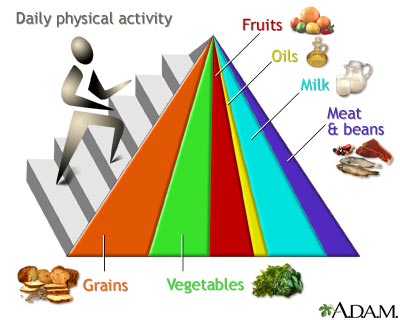Treatment
The biggest challenge in treating anorexia nervosa is having the person recognize that they have an illness. Most persons with anorexia nervosa deny that they have an eating disorder. Individuals often enter treatment only once their condition is fairly advanced.

The goals of treatment are to first restore normal body weight and eating habits. A weight gain of 1 – 3 pounds per week is considered a safe goal.
A number of different programs have been designed to treat anorexia. Sometimes weight gain is achieved using schedules for eating, decreased physical activity, and increased social activity, either on an inpatient or outpatient basis. Many patients start with a short hospital stay and continue to follow-up with a day treatment program.
Care providers who are usually involved in these programs include nurse practitioners, physicians, a nutritionist or dietitian, and mental health care providers.
Treatment is often very challenging, and it requires hard work by patients and their families. Many therapies are likely to be tried until the patient succeeds in overcoming this disorder.
Patients may drop out of programs if they have unrealistic expectations of being “cured” with therapy alone.
Although a short hospital stay is a common way to start treatment, a longer hospital stay may be needed if:
* The person has lost a lot of weight, such as being below 70% of their ideal body weight for their age and height. Severe and life-threatening malnutrition may require feedings through a vein or stomach tube.
* Weight loss continues despite treatment
* Medical complications, such as heart problems, confusion, or low potassium levels develop
* The person has severe depression or thinks about committing suicide
Different kinds of talk therapy are used to treat people with anorexia:
* Individual cognitive behavioral therapy, group therapy, and family therapy have all been successful.
* The goal of therapy is to change a patient’s thoughts or behavior to encourage them to eat in a more healthy way. This kind of therapy is more useful for treating yougner patients who have not had anorexia for a long time.
* If the patient is young, therapy may involve the whole family. Newer approaches look at the family as a part of the solution, rather than as the cause of the eating disorder.
* Support groups may also be a part of treatment. In support groups, patients and families meet and share what they’ve been through.
Medications such as antidepressants, antipsychotics, and mood stabilizers may help some anorexic patients when given as part of a complete treatment program. Examples include: olanzapine (Zyprexa, Zydis), selective serotonin reuptake inhibitors (SSRIs), and antidepressants. These medicines can help treat depression or anxiety.
Although these drugs may help, no medication has been proven to decrease the desire to lose weight.
Support Groups
See: Eating disorders – support group
Prognosis (Expectations)
Anorexia nervosa is a serious and potentially deadly medical condition. By some estimates, it leads to death in 10% of cases. Experienced treatment programs have a good success rate in restoring normal weight, but it is common for the disease to return.
Women who develop this eating disorder at an early age have a better chance of complete recovery. However, most people with anorexia will continue to prefer a lower body weight and be preoccupied with food and calories to some extent. Weight management may be difficult, and long-term treatment may be necessary to help maintain a healthy weight.
Complications
Complications can be severe. A hospital stay may be needed.
Complications may include:
* Bloating or swelling
* Bone weakening
* Electrolyte imbalance (such as low potassium)
* Dangerous heart rhythms
* Decrease in white blood cells which leads to increased risk of infection
* Severe dehydration
* Severe malnutrition
* Seizures due to fluid loss from excessive diarrhea or vomiting
* Thyroid gland problems, which can lead to cold intolerance and constipation
* Tooth erosion and decay
Calling Your Health Care Provider
Talk to your doctor if a loved one is:
* Excessively preoccupied with weight
* Over-exercising
* Restricting his or her food intake
* Severely underweight
Getting early medical help can reduce the severity of an eating disorder.
Anorexia nervosa: Overview, Causes
Anorexia nervosa: Symptoms & Signs, Diagnosis & Tests
Anorexia nervosa: Treatment
Reviewed By : David B. Merrill, MD, Assistant Clinical Professor of Psychiatry, Department of Psychiatry, Columbia University Medical Center, New York, NY. Also reviewed by David Zieve, MD, MHA, Medical Director, A.D.A.M., Inc.
